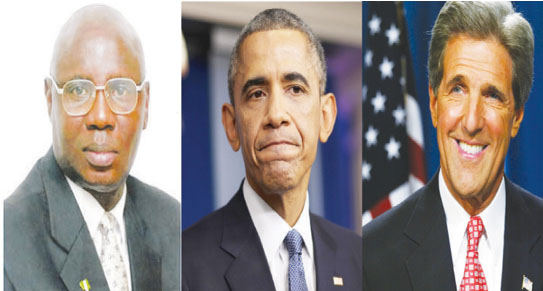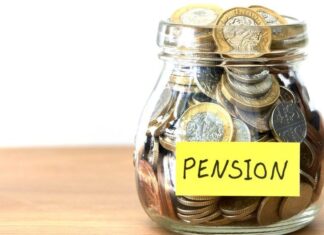The recent statement from the United States embassy in Abuja few hours to President Muhammadu Buhari’s departure to Washington last week to attend the World Nuclear Security Summit hosted by President Barack Obama once more registers Washington’s regard for Nigeria, writes Correspondent, SAM NWOKORO.
In diplomacy, non-verbal signals mean much. Timing of any utterance or pronouncement, or even restating an earlier pronouncement, sends significant message.
That precisely was what the United States Government demonstrated on Thursday, March 31, in Abuja while President Muhammadu Buhari’s presidential jet was probably on his way to the World Summit on Nuclear Security summoned by President Barack Obama which began that Thursday.
The U.S. Embassy in Abuja released a statement in which Washington restated its commitment to maintain and deepen current economic and other forms of assistance to Nigeria. The release by the Public Affairs section of the Embassy was full of eulogies for President Buhari, for the manner he had steered the Nigerian ship so far, especially on his efforts to diversify the economy. It pledged continued support for the President’s policies.
Symbolism
Coming two days after the first anniversary of the election of Buhari, the message could pass as an assessment by Washington of the Nigerian government.
In the statement, Washington restated its commitment to the development aid up to $600 million in diverse sectors of the Nigerian economy, according the U.S. Secretary of State, John Kerry. He pointedly said: “Our development assistance this year will top $600 million. We are working closely with your leaders, the leaders of your Health Ministry to halt the misery that is spread by HIV/AIDS, by malaria and tuberculosis.
Praising Buhari’s efforts so far in the area of security and diversification of the economy, the statement said: “The U.S. is very encouraged by President Buhari’s commitment to diversify the Nigerian economy in order to make it less dependent on a single commodity for export earnings, and that means we have to develop sustainability which depends on a climate that is welcoming to investment and respectful of the environment and of workers’ rights.
“The Power Africa Initiative (an ambitious Washington’s programme formulated in 2014 to provide electricity across all rural villages in Africa) was aimed at strengthening the energy sector where shortage in electricity frustrated populations and impeded growth.
“We are working together to fight illiteracy, especially in the North where the lack of opportunity has been holding people back and Boko Haram murdered thousands and disrupted millions of lives.”
On global security
It could be interpreted that the latest of Washington’s relations with Nigeria is intended to prepare the President’s mind on what he would say at the Summit which Obama hosted between Thursday and Friday.
TheNiche checks reveal that Nigeria, though not having a comprehensive policy blueprint on the use of nuclear energy, is not totally overlooking that segment in her quest to improve electricity power generation in the country. While Obama has described nuclear security as a top priority, the Washington establishment believes that his eighth year at the White House so far has not achieved much in curbing the proliferation of nuclear weapons, especially light weapons, around the world. He has always proposed “deep cuts in nuclear proliferation”.
The President is reported to have said through his lieutenants at the summit that nuclear energy is needed in the world today for peaceful use, especially in the area of electricity.
According to a report from Nigeria’s Permanent Mission at the United Nations released in 2015, Nigeria signed the nuclear non-proliferation treaty in 1968.
“For 14 years, Nigeria has remained one of the fearless promoters of the African Treaty on Nuclear Weapon Free Zone, called the Pelindaba Treaty, which entered into force on July 15, 2009.
“On the question of disarmament, the two principal clusters of Weapons of Mass Destruction (WMD) and conventional weapons, in particular Small Arms and Light Weapons (SALW) category have engaged the attention of the Nigerian delegation at all sessions of the United Nations General Assembly and at all international for a.
“In matters concerning Weapons of Mass Destruction (WMD), the nuclear weapons pose the greatest threat to human existence. The nuclear non-proliferation treaty (NPT) is the treaty that more countries have ratified than any other arms limitation and disarmament agreement, a testament to the treaty’s significance. For this reason and many others, Nigeria had been a major credible voice and to demonstrate her unwavering commitment. She was one of the first member states to sign the non-nuclear proliferation treaty.”
Nigeria in the nuclear programme
Nigeria’s nuclear programme was founded in 1976, while her nuclear aspiration was mooted in 2007 when late head of state, Umaru Yar’Adua said that by 2017 Nigeria planned to add nuclear power to her national grid. Nigeria as at 2013 had a little above 40 per cent of her population only connected to the national grid. It has a research reactor at the Ahmadu Bello University (ABU), Zaria, only for training purposes and reportedly powered by enriched uranium built by the Chinese and commissioned in 2004.
In 2014, then President Goodluck Jonathan at a nuclear summit in Hague said the country would develop a nuclear energy industry. Nigeria has an atomic energy commission with Professor Franklin Osaisai as Chief Executive Officer.
Osaisai said in 2012 that Nigeria had signed an agreement with Rosatom, a European company to co-operate on the design, construction, operation and decommissioning of a nuclear facility with the hope of erecting three other nuclear plants, to make a total capacity of 4,800mw by 2035, each facility gulping $20 billion.
The plants are billed to roar into operation by 2025. For now, Nigeria’s total electricity output is just about 2,000mw and always fluctuating.
However, experts fear that a nuclear power plant is not what Nigeria needs now, as other countries like Germany are doing away with such, preferring solar and other sources of power.














